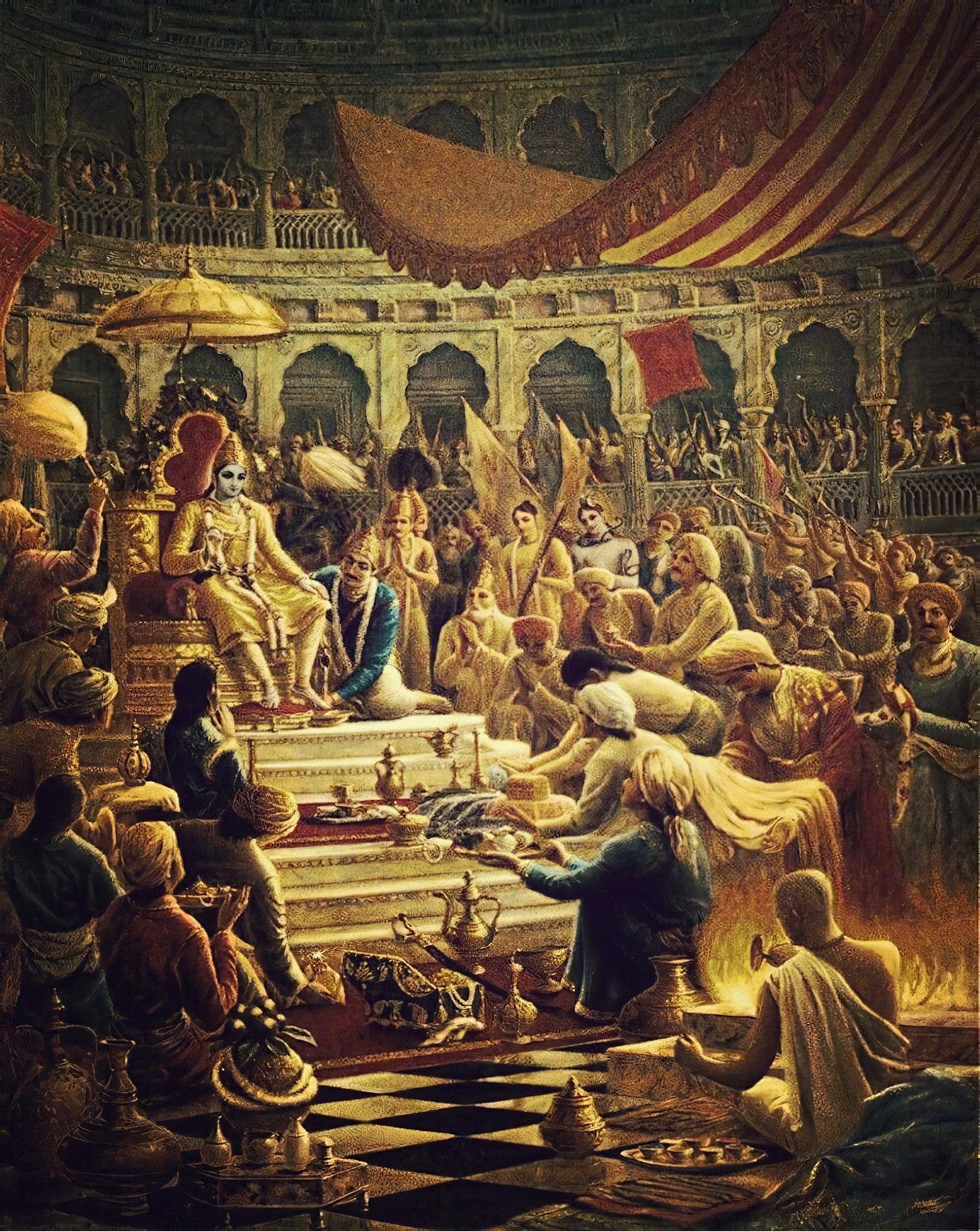All names belong to the Lord (Taittiriya Upanisad 1.1)
All names come originally from the Lord and are simply loaned to demigods and other beings. When Śiva or Vayu are addressed as the Supreme, it should be taken as addressing the Lord.
Section 1: All names belong to the Lord
"The Supreme Lord is the original cause of everything. All words of the scriptures should be interpreted according to this explanation." All names come originally from the Lord and are simply loaned to demigods and other beings. Therefore, when some of the Puranas refer to names such as Śiva or Vayu as the Supreme, these passages should be understood as addressing the Supreme Lord.
Text 1.1.1
om śam no mitraḥ śam varuṇaḥ
śam no bhavatv aryamā
śam na indro bṛhaspatiḥ
śam no viṣṇur urukramaḥ
namo brahmaṇe namaste vāyo
tvam eva pratyakṣam brahmāsi
tvām eva pratyakṣam brahma vadiṣyāmi
ṛtam vadiṣyāmi satyam vadiṣyāmi
tan mām avatu tad-vaktāram avatu
avatu mām avatu vaktāram
om śāntiḥ śāntiḥ śāntiḥ
May the sun give us auspiciousness! May Varuṇa give us auspiciousness! May Aryamā give us auspiciousness! May Indra and Bṛhaspati give us auspiciousness! May Lord Viṣṇu, who as Vamanadeva covered the universe with His great steps, give us auspiciousness! I offer my respects to the Vedas. O Vāyu, I offer my respects to you. You are directly Brahman. I shall speak proper words and the truth. Protect me and protect the speaker. Protect me and protect the speaker. Peace, peace, peace.
Commentary: This is a prayer to invoke auspiciousness at the beginning of scriptural study. It invokes the blessings of different demigods and ultimately recognizes the supremacy of the Supreme Lord.
It may sound strange that this first verse describes Vayu as the Supreme Brahman, but this is actually relatively common. Some of the Puranas refer to Lord Śiva or to different demigods as the Supreme. This is a point explained by Srila Baladeva Vidyabhusana in his commentary on Vedanta-sutra 1.4.28.
He explains that all names come originally from the Lord. These names which belong to the Lord are just loaned to demigods and other beings. Therefore, the rule is that when the ordinary sense of the names mentioned in passages of the scriptures doesn't contradict the general teachings of the Vedas, the ordinary meaning should be accepted. However, when the ordinary meaning of the names contradicts the teachings, then the names should be understood to be names of Lord Viṣṇu. That's how the meaning of these different passages can be understood.
Take for example SB 4.2.29:
naṣṭa-śaucā mūḍha-dhiyo, jaṭā-bhasmāsthi-dhāriṇaḥ
viśantu śiva-dīkṣāyām, yatra daivam surāsavam"Those who vow to worship Lord Śiva are so foolish that they imitate him by keeping long hair on their heads. When initiated into the worship of Lord Śiva, they prefer to live on wine, flesh and other such things."
Here we can understand that the word "Śiva" refers to Lord Śiva, acting as Bhūta-nātha, the Lord of the ghosts and spirits, since this understanding is consistent with the teachings given in other verses from the scriptures.
However, when it's said:
yadā tamas tan na divā na rātrir, na san na cāsac chiva eva kevalaḥ
"When the final darkness comes and there is no longer day or night, when there is no longer being and non-being, then only Lord Śiva exists."
... then the "Śiva" should be taken as a name of the Supreme Lord and not the name of the demigod. In this way, the real meaning of the verse is that "When the final darkness comes and there is no longer day or night when there is no longer being and non-being (at the dissolution of the universe), then only the Supreme Lord exists."
The sutra 1.4.28 is: etena sarve vyākhyātā vyākhyātāḥ, "The Supreme Lord is the original cause of everything. All words of the scriptures should be interpreted according to this explanation."



